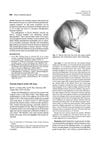56 citations,
October 2016 in “Journal of dermatological science” New insights into the causes and treatments for the autoimmune hair loss condition Alopecia areata have been made.
 34 citations,
October 2017 in “Archivos Argentinos De Pediatria”
34 citations,
October 2017 in “Archivos Argentinos De Pediatria” Alopecia Areata is a complex, unpredictable autoimmune hair loss condition with limited treatment options and a significant psychological impact.
 24 citations,
January 2008 in “KARGER eBooks”
24 citations,
January 2008 in “KARGER eBooks” The document concludes that ongoing research using animal models is crucial for better understanding and treating Alopecia Areata.
 23 citations,
December 2021 in “Frontiers in Immunology”
23 citations,
December 2021 in “Frontiers in Immunology” IL-1 family cytokines are crucial for skin defense and healing, but their imbalance can cause skin diseases.
 23 citations,
July 1982 in “International Journal of Dermatology”
23 citations,
July 1982 in “International Journal of Dermatology” The review concludes that accurate diagnosis of different types of hair loss requires proper biopsy techniques and understanding the hair growth cycle and underlying causes.
9 citations,
September 2009 in “PubMed” Antigen presenting cells around hair follicles are crucial in SLE-related hair loss.
 8 citations,
October 1989 in “Journal of the American Academy of Dermatology”
8 citations,
October 1989 in “Journal of the American Academy of Dermatology” A 5-year-old boy's seasonal hair loss is linked to his allergies.
 2 citations,
August 2017 in “British Journal of Dermatology”
2 citations,
August 2017 in “British Journal of Dermatology” Hair loss in Cronkhite-Canada syndrome may be due to an autoimmune response.
 1 citations,
April 2016 in “CRC Press eBooks”
1 citations,
April 2016 in “CRC Press eBooks” Skin aging reflects overall body aging and can indicate internal health conditions.
 April 2023 in “IP Indian journal of clinical and experimental dermatology”
April 2023 in “IP Indian journal of clinical and experimental dermatology” Lichen planus is a chronic autoimmune disease that is hard to treat and more common in women.
 April 2019 in “Journal of Investigative Dermatology”
April 2019 in “Journal of Investigative Dermatology” Eating grape powder may reduce the severity of skin allergy symptoms.
181 citations,
February 2019 in “Cell” Innate lymphoid cells help control skin bacteria by regulating sebaceous glands.
 January 2024 in “Elsevier eBooks”
January 2024 in “Elsevier eBooks” Increasing regulatory T cells may help treat alopecia areata by reducing autoimmunity and promoting hair growth.

The document says hair loss can happen after recovering from COVID-19 and it can cause psychological discomfort.
 November 2022 in “The journal of investigative dermatology/Journal of investigative dermatology”
November 2022 in “The journal of investigative dermatology/Journal of investigative dermatology” The study suggests a link between varicella-zoster virus and segmental vitiligo, with evidence of the virus disrupting skin pigment cells.
717 citations,
June 2010 in “Nature” Alopecia areata involves both innate and adaptive immunity, with specific genes linked to the disease.
278 citations,
May 2013 in “Ca” Targeted anticancer therapies can cause severe side effects similar to traditional chemotherapy, but with different types.
7 citations,
July 2013 in “InTech eBooks” Oral lichen planus is a chronic disease causing mouth discomfort and sometimes needs immunosuppressive treatment.
 July 2023 in “Journal of Clinical Medicine”
July 2023 in “Journal of Clinical Medicine” The document concludes that understanding hair follicle histology and the hair cycle is crucial for diagnosing alopecia.
2 citations,
December 2022 in “The Journal of Dermatology” Patients with hidradenitis suppurativa have higher levels of cell-free DNA in their blood.
 34 citations,
September 2020 in “BMC Endocrine Disorders”
34 citations,
September 2020 in “BMC Endocrine Disorders” Existing drug dexamethasone may lower death risk in severe COVID-19 cases; more research needed for other drugs.
10 citations,
November 2017 in “Skin Appendage Disorders” Erosive pustular dermatosis in elderly people may be linked to aging immune systems and skin damage.
 48 citations,
July 1992 in “International Journal of Dermatology”
48 citations,
July 1992 in “International Journal of Dermatology” HIV can cause various nail and hair disorders, important for early diagnosis and treatment.
 19 citations,
January 2018 in “Scientific Reports”
19 citations,
January 2018 in “Scientific Reports” Non-immune factors play a significant role in alopecia areata.
 349 citations,
January 2005 in “The FASEB journal”
349 citations,
January 2005 in “The FASEB journal” Human skin can make serotonin and melatonin, which help protect and maintain it.
 22 citations,
June 2012 in “PLOS ONE”
22 citations,
June 2012 in “PLOS ONE” Cholesterol-related compounds can stop hair growth and cause inflammation in a type of scarring hair loss.
 5 citations,
February 2010 in “Expert Review of Dermatology”
5 citations,
February 2010 in “Expert Review of Dermatology” Treating both the mind and skin together, especially by managing stress, can greatly improve outcomes for skin disorders linked to psychological issues.
 2 citations,
January 2019
2 citations,
January 2019 The document concludes that autoimmune skin disorders are treated with corticosteroids and immunosuppressive drugs.

A man with four autoimmune diseases suggests a new category for multiple autoimmune syndrome.

Different connective tissue disorders have unique symptoms and treatments, with varying outcomes and often require ongoing care from a specialist.





















